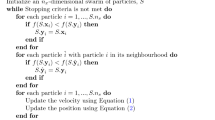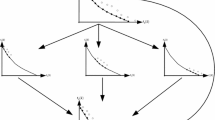Abstract
Particle swarm optimization (PSO) does not scale well to large-scale optimization problems (LSOPs). A divide-and-conquer approach towards solving LSOPs has been shown to be very effective in scaling PSO, resulting in a family of co-operative PSO (CPSO) algorithms. Recently, two adaptive co-operative PSO approaches have been developed to improve performance on non-separable problems, namely decomposition CPSO (DCPSO) and merging CPSO (MCPSO). Though DCPSO and MCPSO were shown to perform competitively, they are limited in their ability to explore variable groupings. This paper proposes incorporating random grouping of decision variables into DCPSO (RG-DCPSO) and MCPSO (RG-MCPSO) to better cope with complex variable dependencies. These algorithms were compared to results from five other decomposition-based approaches in order to determine if applying random grouping to DCPSO and MCPSO leads to an improvement in performance. The empirical results show that when applied to function optimization problems, RG-DCPSO was able to achieve the best overall final objective function values in environments with up to 1000 dimensions. The results also show that RG-MCPSO performs well for non-separable objective functions in large-dimensional spaces with 500 and 1000 dimensions.
Access this chapter
Tax calculation will be finalised at checkout
Purchases are for personal use only
Similar content being viewed by others
Notes
- 1.
\(n_x\) is the number of decision variables.
References
Barry, W.: Generating aesthetically pleasing images in a virtual environment using particle swarm optimization. Ph.D. thesis, Brock University (2012)
Clark, M.: Comparative study on cooperative particle swarm optimization decomposition methods for large-scale optimization. Master’s thesis, Brock University, March 2021. https://dr.library.brocku.ca/handle/10464/15031
Cleghorn, C.W., Engelbrecht, A.P.: Particle swarm convergence: an empirical investigation. In: Proceedings of the IEEE Congress on Evolutionary Computation, pp. 2524–2530. IEEE (2014)
Douglas, J., Engelbrecht, A.P., Ombuki-Berman, B.M.: Merging and decomposition variants of cooperative particle swarm optimization: new algorithms for large scale optimization problems. In: Proceedings of the 2nd International Conference on Intelligent Systems, Metaheuristics and Swarm Intelligence, pp. 70–77. ACM (2018)
Erwin, K., Engelbrecht, A.P.: Set-based particle swarm optimization for portfolio optimization. In: Dorigo, M., et al. (eds.) ANTS 2020. LNCS, vol. 12421, pp. 333–339. Springer, Cham (2020). https://doi.org/10.1007/978-3-030-60376-2_28
Hajihassani, M., Armaghani, D.J., Kalatehjari, R.: Applications of particle swarm optimization in geotechnical engineering: a comprehensive review. Geotech. Geol. Eng. 36, 705–722 (2018)
Hereford, J.M.: A distributed particle swarm optimization algorithm for swarm robotic applications. In: IEEE International Congress on Evolutionary Computation, pp. 1678–1685. IEEE (2006)
Kennedy, J., Eberhart, R.: Particle swarm optimization. In: Proceedings of International Conference on Neural Networks, vol. 4, pp. 1942–1948 (1995)
Khare, A., Rangnekar, S.: A review of particle swarm optimization and its applications in solar photovoltaic system. Appl. Soft Comput. 13(5), 2997–3006 (2013)
Kruskal, W.H., Wallis, W.A.: Use of ranks in one-criterion variance analysis. J. Am. Stat. Assoc. 47(260), 583–621 (1952)
Li, X., Yao, X.: Cooperatively coevolving particle swarms for large scale optimization. IEEE Trans. Evol. Comput. 16(2), 210–224 (2012)
Mann, H.B., Whitney, D.R.: On a test of whether one of two random variables is stochastically larger than the other. Ann. Math. Stat. 18(1), 50–60 (1947)
Neethling, M., Engelbrecht, A.: Determining RNA secondary structure using set-based particle swarm optimization. In: Proceedings of the IEEE Congress on Evolutionary Computation (2006)
Oldewage, E.T.: The perils of particle swarm optimization in high dimensional problem spaces. Master’s thesis, University of Pretoria (2017)
Oldewage, E.T., Engelbrecht, A.P., Cleghorn, C.W.: The merits of velocity clamping particle swarm optimisation in high dimensional spaces. In: Proceedings of the IEEE Symposium Series on Computational Intelligence, pp. 1–8 (2017)
Oldewage, E.T., Engelbrecht, A.P., Cleghorn, C.W.: Boundary constraint handling techniques for particle swarm optimization in high dimensional problem spaces. In: Dorigo, M., Birattari, M., Blum, C., Christensen, A.L., Reina, A., Trianni, V. (eds.) ANTS 2018. LNCS, vol. 11172, pp. 333–341. Springer, Cham (2018). https://doi.org/10.1007/978-3-030-00533-7_27
Oldewage, E.T., Engelbrecht, A.P., Cleghorn, C.W.: Movement patterns of a particle swarm in high dimensional spaces. Inf. Sci. 512, 1043–1062 (2020)
Pluhacek, M., Senkerik, R., Viktorin, A., Kadavt, T., Zelinka, I.: A review of real-world applications of particle swarm optimization algorithm. In: Proceedings of the International Conference on Advanced Engineering Theory and Applications (2017)
Shi, Y., Eberhart, R.C.: Parameter selection in particle swarm optimization. In: Proceedings of Evolutionary Programming VII, pp. 591–600 (2005)
Sopov, E., Vakhnin, A., Semenkin, E.: On tuning group sizes in the random adaptive grouping algorithm for large-scale global optimization problems. In: Proceedings of the International Conference on Applied Mathematics Computational Science, pp. 134–13411 (2018)
Sun, Y., Kirley, M., Halgamuge, S.K.: A recursive decomposition method for large scale continuous optimization. IEEE Trans. Evol. Comput. 22(5), 647–661 (2018)
Tang, K., Li, X., Suganthan, P.N., Yang, Z., Weise, T.: Benchmark functions for the CEC 2010 special session and competition on large-scale global optimization (2010)
Van den Bergh, F., Engelbrecht, A.P.: A cooperative approach to particle swarm optimization. IEEE Trans. Evol. Comput. 8(3), 225–239 (2004)
Van der Merwe, D., Engelbrecht, A.: Data clustering using particle swarm optimization. In: Proceedings of IEEE Congress on Evolutionary Computation, vol. 1, pp. 215–220, December 2003
Yang, Z., Tang, K., Yao, X.: Large scale evolutionary optimization using cooperative coevolution. Inf. Sci. 178(15), 2985–2999 (2008)
Zeng, T., et al.: Artificial bee colony based on adaptive search strategy and random grouping mechanism. Expert Syst. Appl. 192, 116332 (2022)
Zhang, W., Ma, D., Wei, J., Liang, H.: A parameter selection strategy for particle swarm optimization based on particle positions. Expert Syst. Appl. 41(7), 3576–3584 (2014)
Author information
Authors and Affiliations
Corresponding author
Editor information
Editors and Affiliations
Rights and permissions
Copyright information
© 2022 Springer Nature Switzerland AG
About this paper
Cite this paper
McNulty, A., Ombuki-Berman, B., Engelbrecht, A. (2022). Decomposition and Merging Co-operative Particle Swarm Optimization with Random Grouping. In: Dorigo, M., et al. Swarm Intelligence. ANTS 2022. Lecture Notes in Computer Science, vol 13491. Springer, Cham. https://doi.org/10.1007/978-3-031-20176-9_10
Download citation
DOI: https://doi.org/10.1007/978-3-031-20176-9_10
Published:
Publisher Name: Springer, Cham
Print ISBN: 978-3-031-20175-2
Online ISBN: 978-3-031-20176-9
eBook Packages: Computer ScienceComputer Science (R0)




